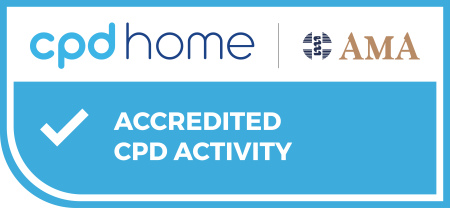Finding accredited CPD
This comprehensive unit on Benign Non-Melanocytic Skin Tumors Commonly Seen in Practice explores the identification, diagnosis, and management of the most frequently encountered benign non-melanocytic skin lesions, including:
Seborrheic Keratosis: Learn to recognize subtypes such as acanthotic, verrucous, reticulated, and irritated forms. Key dermoscopic features include milia-like cysts, comedo-like openings, and brain-like appearances. The unit emphasises differentiating seborrheic keratosis from melanoma mimics like verrucous melanoma through advanced dermoscopic evaluation.
Dermatofibroma: Understand the central white, structureless areas surrounded by fine brown circles, a hallmark of dermatofibroma. This section also covers its differentiation from hypopigmented nevi and other conditions using dermoscopy.
Vascular Tumors: Explore hemangiomas, angiokeratomas, and pyogenic granulomas, focusing on dermoscopic patterns such as red-purple clods, thrombosed lacunas, and white intersections. Guidance is provided on when to biopsy rapidly growing or ulcerated lesions to rule out malignant conditions like amelanotic melanoma.
Sebaceous Hyperplasia: Identify radial crown-like vessels and polylobular yellowish structures characteristic of sebaceous hyperplasia. Participants will also learn to distinguish it from basal cell carcinoma and intradermal nevi using dermoscopy.
The unit also highlights factors influencing lesion morphology, including age, body site, and pigmentation. Practical management tips include the use of excisions and biopsies to address diagnostic uncertainties and ensure patient safety.
By completing this course, participants will gain confidence in using dermoscopy to diagnose and manage benign lesions effectively while minimising the risk of missing malignancies. This skill is crucial for enhancing diagnostic accuracy and improving patient care outcomes.
Cost: $195
Suitable for: All degree qualified medical practitioners.
Study mode: 100% online
Disclaimer: Please note, once you click 'Register now' you will be leaving the AMA’s CPD Home website and entering a third-party education provider’s website. If you choose to register for this learning, you will need to provide some of your personal information directly to the third-party education provider. If you have any queries about how third-party education providers use, disclose or store your personal information you should consult their privacy policy.
Upon completion, your CPD activity record may take up to 4 weeks to be reflected on your CPD Home Dashboard.
You have to log in to see the content of this module.
Provided by
Accredited by
